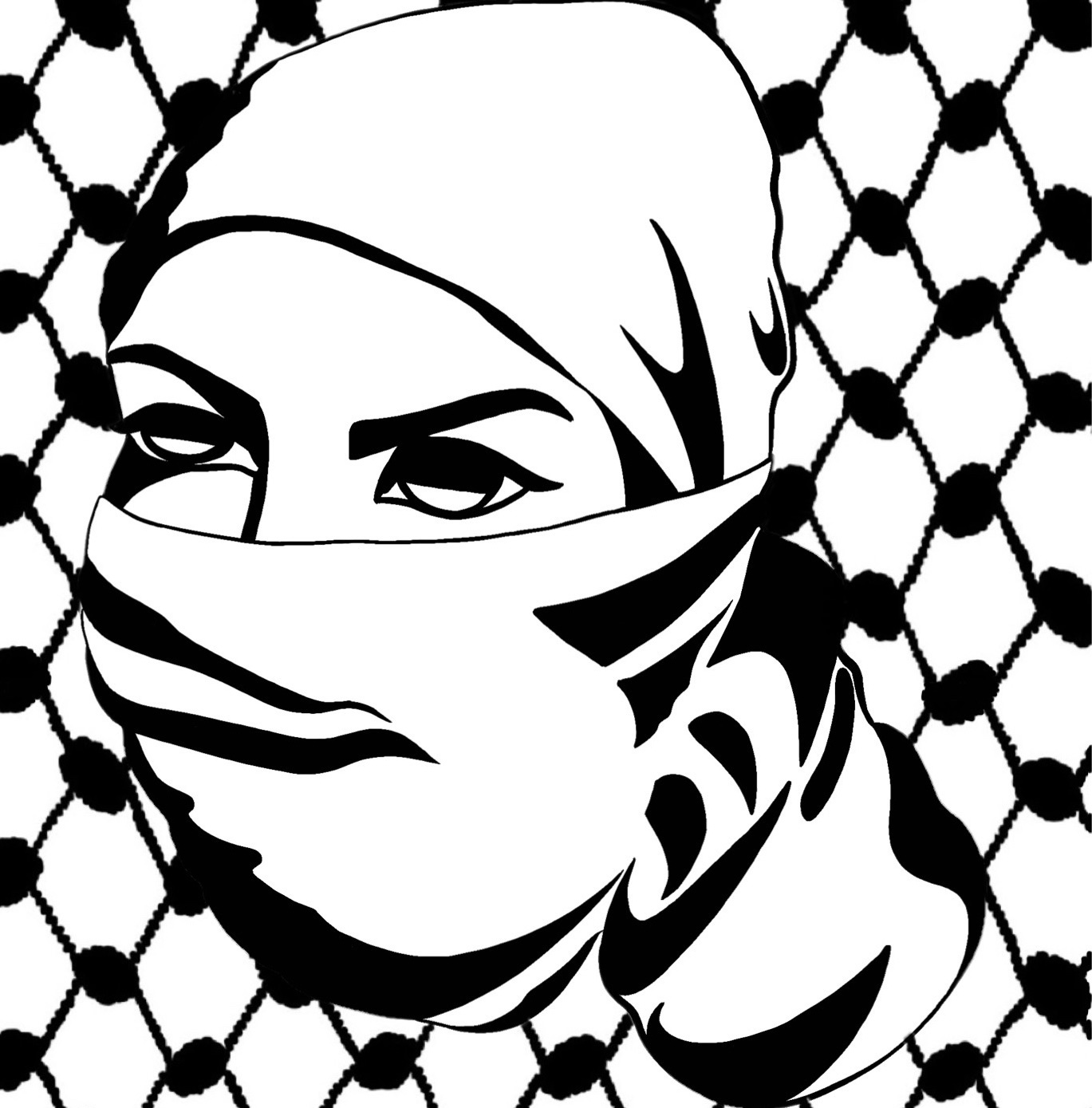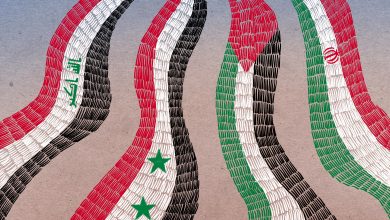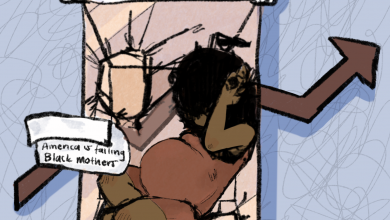Purple-Washing: Israel’s Faux Feminism Through the Lens of Medical Apartheid

Design by Coral Utnehmer
Image Description: Black and white drawing of a woman’s face with a cloth wrapped around her head in front of a Kuffiyeh pattern background.
CW: Zionism, gender-based violence
Israel has historically co-opted feminist struggles in order to justify the Zionist movement. Appropriating and capitalizing on progressive conversations to benefit their own agenda is a common tactic settler states use to distract from their own human rights violations. The process in which the state appeals to women’s rights to propagate harmful agendas is called purple-washing. In the context of the Middle East and North Africa, purple-washing rhetoric often plays on tropes of civilized Europeans and Americans rescuing Muslim women from their oppressive surroundings. The case with Israel is similar, where they claim Israelis have “saved” Palestinian women from “inherently evil” Palestinian men. These tropes are rooted in racism and Orientalism — an imperialist philosophy that upholds white supremacy by stereotyping, exoticizing, and generalizing Middle Eastern communities. This is connected to misogyny, which the occupying state of Israel is not exempt from. Israel employs purple-washing to craft a state-controlled narrative of gender equality for the international community and the US, but their settler colonial practices towards Palestinian women, such as medical apartheid, are violent and do not reflect this faux liberal jargon.
For a state that boasts of its progress in gender equality, it is startling to see Israel’s continued violations of the rights and dignity of Palestinian women. Settlers regularly dehumanize and (physically, emotionally, sexually) abuse Palestinian women. Israeli military officers and policymakers have gone so far as to release public statements promoting physical and sexual gender-based violence against Palestinian women. Meanwhile, Israel continues to tout itself as a feminist safe haven in the Middle East, claiming that settler women’s mandatory participation in the IDF — the main perpetrator of Israeli state violence against Palestinians — is empowering and liberating. However, when a Palestinian is killed or imprisoned, it does not matter to them whether the Israeli soldier killing or imprisoning them is a man or a woman.
The Israeli state portrays itself, much like the United States, as a champion of feminist ideology. This narrative is juxtaposed with the Orientalist construction of the Middle East, which frames the region as fundamentally misogynistic. Thus, Israel vs. the rest of the Middle East is constructed as a battle between good and evil, right and wrong. The dichotomies strip away nuance and serve to emphasize Israel’s role as a savior. Gender identity is irrelevant when Palestinians are tried in Israel’s military courts, where the overall conviction rate is 99 percent. Children as young as nine years old are arrested, sentenced, and murdered. Settlers are not held anywhere near these high rates of arrest and imprisonment. For decades, the Israeli army has also practiced militarized sexual violence; Sanaa, a Palestinian woman interviewed for Jadaliyya, recalls, “I must tell you that I was terrorized when they invaded the house and evicted us…my fears of (…) being raped by his blue big hands and more…were the most terrifying moments of my life.” Meanwhile, even amongst its own people, the Israeli state practices racial and sexual violence, as it gave Ethiopian women in Israel birth control without their consent for years. Despite this, the Israeli occupation is still portrayed as a savior in the face of the “uncivilized,” “terrorist” Arabs, Muslims, and Palestinians in Palestine. It is here that we draw the line between the US and Israel – while the US has claimed to “save Muslim women,” “Zionism has never exoticised them – never aspired to ‘save’, ‘modernise’ or ‘liberate’ them. It has always wanted them dead.” Third World feminists in the Middle East, then, face tensions in addressing their overlapping oppressions between the patriarchy and colonialism.
Pan-Arab feminist movements have roots in the Palestinian liberation struggle. Huda Sha’rawi, an early pioneering Egyptian feminist, was heavily influenced by the nationalist movement in Palestine. The Euro-Americanization of women’s rights is one way that the dependence on complete liberation manifests itself. Colonialism’s use of feminism denotes it as immediately suspect in Arab eyes, argues Leila Ahmad, an Egyptian-American Islam and Gender Studies professor. Arab feminists are often labeled traitors for supporting the ideologies that have led to the “saving Muslim women” narrative, popular in Euro-American media. Meanwhile, Euro-American countries maintain themselves as a role model for gender equality despite the injustices they commit in the wretched parts of the Earth. Women’s rights advocates in the Middle East face a multifaceted dilemma; not only must they confront the patriarchy at home, but they must also confront the dominant colonial narrative that has seeped into every space they could hope to consider home. By perpetuating Israel as the “forward-moving” protector in the face of “backwards-aligning” Arabs, Euro-American centric narratives promote a cycle of oppression in which Arab women bear the brunt. Until feminism disaligns itself from the colonial narrative, women in Palestine, Egypt, and every other formerly colonized area must fight two fights. We must sweep aside its liberal aesthetic and recognize the Israeli occupation’s concrete consequences on Arab, and in particular Palestinian, women’s bodies.
Palestinian women have unequal access to healthcare due to the occupation’s restrictions. The occupation puts in place checkpoints, roadblocks, and closes off areas which hinder pregnant women in need of urgent care. Many women expressed concern at being forced to give birth at checkpoints under risky conditions. Israeli forces have barred family members from visiting women giving birth in the hospital; oftentimes, women go through labor without critical emotional support. Israel’s biopolitics thus endangers Palestinian reproductive health and deters social support to Palestinian women. Palestinian women’s access to child care is also constrained because of Israel’s prolonged military occupation. Research conducted in the Occupied Territories spanning from 2000 to 2014 demonstrates that the intensity of conflict has a negative impact on access to care. Rates of maternal and prenatal health services like vaccination tend to decrease when Israeli military violence spikes, with little differential effect within the various socioeconomic strata of Palestinian households. The Israeli occupation therefore sustains a medical apartheid that uniquely affects Palestinian women by crippling their access to reproductive and prenatal care.
There is little doubt that behind the ideological mask the state desperately tries to hide behind, Israel not only disregards the rights of Palestinian women, but is a perpetrator of state-sponsored gender violence. At one point we must ask ourselves, to what extent does a state support women’s rights when those women are from a certain ethnic background? Is it possible that a state may truly stand in solidarity in the fight for women’s liberation, while destroying the very facilities that non-Israeli women depend on for the same treatment that Israeli women have access to? Being an ally of women’s rights does not mean being exclusionary with one’s support, but rather showing solidarity and respect for women of all backgrounds. Israel has demonstrated that they are only willing to show solidarity with women when those women are of a certain ethnic identity, thus reinforcing the ethno-supremacy complex of Zionism. Israel’s faux feminism is hypocritical and exclusionary; it is an obstruction to the liberation of Palestinian women as it attempts to wax over the fundamental way in which Palestinian women’s struggle for freedom is intrinsically tied to the abolition of Zionism.




